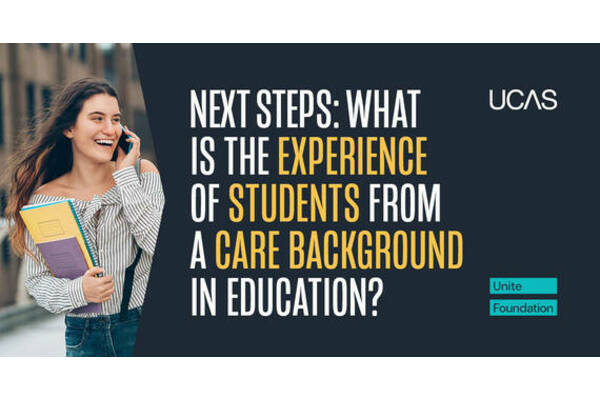UCAS has published a new report on Next steps: What is the experience of students from a care background in education? The report has been written in partnership with the Unite Foundation, and with support from NNECL. It explores how care-experienced students who have applied to university or college this year feel about the support they have received so far, what they’re looking forward to in higher education, and their experience of applying to HE.
Key findings from the report include:
- Access to specific guidance about going to HE as a care-experienced student is inconsistent: 60% stated they received no guidance specific to being care experienced during their application journey. Applicants seek advice from a wide variety of sources, not all of whom will have had access to the latest information and resources about UCAS applications or the specific support available in HE for care-experienced students.
- The intersectionality of care experience with other personal characteristics presents additional challenges: these applicants are 38% more likely than non-care-experienced applicants to come from the most disadvantaged areas (POLAR4 Quintile 1), twice as likely to be from Mixed or Black ethnic groups, 79% more likely to identify as LGBT+, almost twice as likely to share a disability, and nearly three times as likely to share a mental health condition.
- Care-experienced students’ journeys are often longer and non-linear: one third of applicants were aged 21 or above, compared to one fifth of UK applicants without a care background. Applicants were also more than twice as likely to take the Access to HE Diploma.
- Applicants from a care background are motivated by career prospects, especially in health and social care: they are 179% more likely to apply for health and social care than non-care-experienced students, and 50% more likely to apply for nursing and midwifery.
- HE choices are strongly influenced by applicants’ individual support needs: over three quarters prioritised access to mental health and wellbeing support, with financial support, accommodation, and pre-entry support also important influential factors.
The report explores the intersectionality of care experience with other personal characteristics to understand where there may be additional barriers and considerations. Amongst the recommendations, UCAS is calling for the journey of care-experienced students into higher education and apprenticeships to be made easier through the provision of verified care leaver data, and for UUK to explore the implementation of access thresholds across the UK. It is also calling for greater consideration for mature care-experienced individuals through the Access to HE qualification and the Lifelong Loan Entitlement, broader engagement with those directly advising care-experienced students, and an understanding of how the intersectionality of care experience and other characteristics can improve holistic policy and practice across universities and colleges.
In a reflection piece within the report, Patricia Ambrose, NNECL Director, commented,
This new report from UCAS clearly highlights the challenges oftenCopies of the report and its underlying data are available here.
faced by care-experienced applicants when thinking about, and
moving into, higher education. While many universities and colleges
continue to develop and expand the range of support they provide,
there is still much more that needs to be done to ensure that all of
these applicants receive the high quality and personalised guidance
they need.
As a practitioner network, NNECL is committed to working with UCAS, virtual schools, local authorities, fostering agencies and all other relevant organisations to transform the educational landscape for care-experienced people. These students deserve the very best advice and support from us all.




